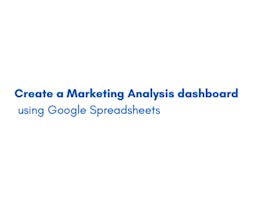This course will take you through the various parts of analytical dashboarding: from best practices for designing a dashboard, creating a unified analytical environment, to deploying and publishing visualizations. We will briefly discuss the advanced visualization techniques and you will develop an information layout of the biggest gainers and losers in the financial markets and compare those movements to the economic data as your capstone project.



Dashboarding and Deployment
This course is part of Use Tableau for Your Data Science Workflow Specialization

Instructor: Majed Al-Ghandour
Sponsored by PTT Global Chemical
Details to know

Add to your LinkedIn profile
4 assignments
See how employees at top companies are mastering in-demand skills

Build your subject-matter expertise
- Learn new concepts from industry experts
- Gain a foundational understanding of a subject or tool
- Develop job-relevant skills with hands-on projects
- Earn a shareable career certificate


Earn a career certificate
Add this credential to your LinkedIn profile, resume, or CV
Share it on social media and in your performance review

There are 4 modules in this course
Now that you know the primary visualization methods and how to address the action and interaction patterns necessary for visual analytics, it’s time to put it all together. What are the principles of good dashboard design and how do you determine the most effective dashboard to communicate your story? In this module, we’ll take a look at the considerations and processes for creating an analytical dashboard.
What's included
1 video4 readings1 assignment1 discussion prompt
After the target audience, objectives, and principles have been clearly defined, creating the dashboard itself is less of a technical exercise and more of a design challenge. This module brings all these elements together into a unified analytical environment. You’ll begin to put everything together in Tableau and design your dashboard.
What's included
2 videos2 readings1 assignment1 discussion prompt
In the past, deploying and publishing visual analytics was challenging for many organizations. The underlying data management and engineering pipelines were much less capable than today’s backend systems. In this module, we’ll investigate what to do as new analytical platforms enter the market and mature over time, how to stand out as a data visualization expert, and discuss considerations for creating custom visualizations.
What's included
2 videos3 readings1 assignment1 discussion prompt
Consider what you’ve learned so far in this specialization. How might you use geospatial analysis or network analysis in your data science workflow? In addition, how might you design visuals to explain how data has changed over time? In this module, we’ll briefly discuss advanced features that can be used to answer these questions in Tableau. As you reflect on the course content, you will also finalize your capstone project, making use of storytelling principles and best practices for focusing and decluttering, and develop an information layout.
What's included
2 videos4 readings1 assignment1 peer review
Instructor

Offered by
Why people choose Coursera for their career




Recommended if you're interested in Data Science

Coursera Project Network

LearnKartS

Corporate Finance Institute

Coursera Project Network

Open new doors with Coursera Plus
Unlimited access to 10,000+ world-class courses, hands-on projects, and job-ready certificate programs - all included in your subscription
Advance your career with an online degree
Earn a degree from world-class universities - 100% online
Join over 3,400 global companies that choose Coursera for Business
Upskill your employees to excel in the digital economy


